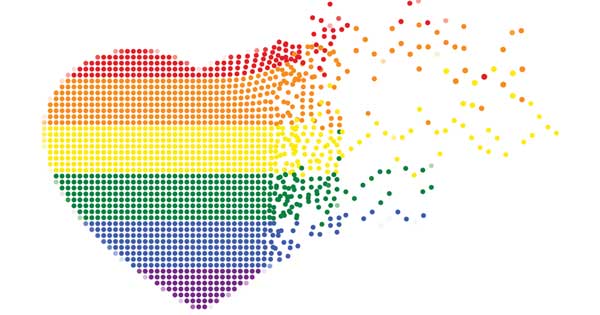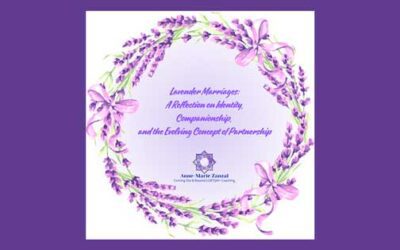MY FRIEND MIRIAM GRACE AND I HAVE WORKED WITH WOMEN COMING OUT LATER IN LIFE FOR THE LAST SEVERAL YEARS.
THE FOLLOWING IS A CONVERSATION BETWEEN THE TWO OF US THAT EXPLORES WHAT IT MEANS TO FALL IN LOVE WITH A CATALYST (THE WOMAN WHO OPENS UP OUR SEXUALITY FOR SOME OF US), AND HOW TO MOVE ON WHEN THINGS GO WRONG.
A-M: Hi Miriam. As you know I work with many women coming out later in life. It is wonderful to share this collegial relationship with you. I know your experience as a psychotherapist and I know you have worked with women who are coming out as well.
M: Hi Anne-Marie, thank you for asking me about this topic. It’s been very helpful to share our thoughts over recent years about supporting women coming out and lovely to chat via video with you. I’ve had 30 years in practice as a psychotherapist, including extra training about working with LGBT+ clients, but it’s only recently I’ve had so many women talking to me about today’s topic. Do you want to say a bit more about our interview today?

The Phenomenon of the Catalyst
A-M: There is a phenomenon among some of the women I work with about what is called a catalyst. In science a catalyst is known as a substance that increases the rate of chemical reaction, but a secondary definition is a person or thing that precipitates an event. I have found that many women have a life changing event (for example death of a loved one, divorce, illness, etc) and that precipitates their coming out. While others meet and fall in love with a female friend.
M: Yes, the catalyst may be a series of events but we’re wanting to gain more understanding about the Catalyst Relationship?
Understanding the Catalyst Relationship
A-M: Yes. These relationships run the gamut from unrequited, platonic, to sexual. What I’m particularly wondering is why it is that, when this relationship with a catalyst ends for some women, is that it’s so very difficult to “get over”.
M: This is what we are seeing isn’t it, a repeated and common theme, among women who fall in love with another woman, which changes their life and then the subsequent loss? Have you heard the saying, “You’ve never really had your heart broken until it has been broken by a woman?”
A-M: The loss of this relationship is devastating and many women struggle to move on. I know that it has ties to a woman’s queer identity – but can you provide me with some insights and suggestions about other causes and how to recover from a catalyst relationship?
Other causes of Catalyst Relationships and how to recover
M: Well, this is acquired wisdom from so many women, I don’t own the wisdom, but I have put it into a framework that is informed by my training. Of course, everyone’s experience is slightly different and not all experiences are reflective of our own situation or feelings, but it’s a recurring theme, the unique pain of traumatic break up with a catalyst and the sense the woman has that they can’t move on from this unbearable pain.
“You’ve never really had your heart broken until it has been broken by a woman.”
— All Lesbians Everywhere
Why does the end of a catalyst relationship hurt so much?
M: For many the catalyst is the woman who didn’t just awaken their sexuality, they may feel as if she opened their soul, or blew their whole, carefully constructed, life apart.
The confusion being that while the resulting losses happened, there were also undeniably life altering and life affirming aspects to the relationship too. The woman we are supporting may have a mixture of pride in her ability to allow herself to know this great, life changing love, her truth and to have faced it and followed it wholeheartedly – it is, let’s face it, a growthful and amazing revelation!
A-M: The catalyst has brought authenticity and freedom, as well as the realisation that life will never be the same again and this causes losses, such as marriage to their husbands, maybe the family home, and their relationships with family, work and friends. Everything can change as a result of the presence of the catalyst.
The Catalyst can change EVERYTHING
M: That’s right. Sometimes a first same sex relationship also contains elements of secrecy, danger, and fear too. This will increase the intensity of attachment. The psychology of ‘you and me against the world’, star crossed lovers, classic Romeo and Juliet (or shall we say Juliet and Juliet), and attraction to the forbidden.
She considers giving up, or even actually gives up, everything to be with the catalyst. And there’s an exhilaration and liberation as she bravely goes off into the sunset with her true love …
A-M: But sometimes the relationship doesn’t work out. It goes wrong. Or the cost of the new life begins to hit home?
When it doesn’t work, the cost of a new life hits home
M: That’s very hard for someone who has just had their life changed by this revelation, hard to accept that the happy ending may not be happening. At this point many deny problems and start ‘papering over the cracks’ when they appear. They may begin to fit themselves to please their new love, mimicking how they once fitted themselves into society’s expectations of them, tragically not realising that they are selling the very soul they’ve reclaimed!
They may resist seeing the problems?
M: Yes, guilt about the coming out process and the impact on others in her life is likely to heighten her urgency to prove it was all worth it. It’s hard to consider that it might have been ‘out of the frying pan and into the fire’. Rather than accepting it was a mistake, it’s easier to continue investing in this course of action.
We should never be this undiscerning about a partner (even if we may be for our family and our kids). But the bonding that come from the physical connection with a lesbian lover induces a feeling that the couple are almost of one body, family. This new love may gain the woman’s loyalty that she would usually reserve for family.
What causes lack of discernment?
A-M: So the lack of discernment comes from this bonding experience? Is this particular to lesbians? Or to catalyst relationships?
M: That’s a very interesting question. Sometimes I think you’ve got to be quite relationally mature to handle a lesbian relationship, but I’m generalizing of course, and a life long lesbian won’t know anything different to the intensity that can sometimes come from ‘the doubling effect’.
The “doubling effect”
A-M: What is the doubling effect?
M: Yes, I don’t always refer to it because it’s problematic in that the theory of it depends on generalizing and gender stereotypes, however I find it a useful concept to offer if it helps our clients to find meaning for themselves (they can reject the concept if it doesn’t fit them).
The doubling effect is seen in same sex relationships, so typically two men brought up to be ‘masculine’, may have difficulty talking about feelings and expressing affection in a same sex relationship, because their so called masculine traits are doubled, whereas female capacity for oxytocin inducing relationships is potentially very high. Eye contact, gentle touch, many of the qualities of mother / baby bonding such as cooing and cuddling are more easily expressed by women and can result in a depth of bonding that if not peculiar to a lesbian context is certainly rare elsewhere. Lesbian lovers often have a very strong cocktail of deep bonding emotions and chemicals. Some women are real bonders and bond for life just as they may have as mothers to children.
You may begin to fit yourself to please your new love
In a catalyst relationship this can mean the catalyst can do nothing to break the bond. Although under other circumstances their behavior should and would break the trust. I’ve seen this in same sex relationships and it is initially puzzling, to our client also, why the relationship continues playing out when it is no longer healthy?They may begin to fit themselves to please their new love
When to seek counseling
A-M: So would you recommend counseling at this point?
M: Yes, either individual or couples counseling.
M: You might notice a reluctance to give up on the relationship. One woman told me, “I assumed it was my responsibility i got us to counseling, I tried to change my attachment style, I didn’t give up. I was classically clinging to a mistake because I had risked everything, given up everything, to be with her. She had to be all I said she was…” Secret relationships are also a problem if there are unhealthy dynamics because the usual checks and balances from friends and family are missing.
Keeping the relationship going
A-M: So the part she plays in her continuing injury may be to keep the relationship going by not letting go. Or by not confiding in others?
M: Yes, refusal to accept the ending definitely prolongs the agony. If she has support though, from people like you or me, she is less likely to continue the destructive cycle. She is more likely to align herself with her own inner wisdom. A support person or support group, provides the feedback, safety and reality checks.
Often the relationship or the realization of sexuality is secret so can feel as if this situation has only ever happened to this person. I can’t overstate the importance of having a community or at least a support person to confide in. I’ve a quote a collected pertinent to this, “My awakening was so powerful I attributed it to her and held on to her with great tenacity.” the usual checks and balances from friends and family are missing
How did things end up going downhill
A-M: So many will say, “How is it that we felt like soul mates who were destined to be and then it all went down-hill?”
M: To some extent, exploring this endlessly can simply be a delaying process. We don’t really know why some relationships don’t work out so looking for answers may be part of the the ‘bargaining’ process associated with grieving. Often, however, it is to do with different attachment styles. While this is also true of other relationships, the switch from the enticing connection experienced between the couple followed by the clash of attachment styles can be devastating and shocking.
As a women who has been in relationships with men in the past, the male pattern of avoidance and pulling away is often known. The appeal of a relationship with a woman is usually the deep connection so when this changes into the distancing behavior of one partner it’s a contrast, a shock! The new lesbian will not have seen this coming. We might expect detachment from a male partner but not our female lover.
A-M: Or conversely?
Having an avoidant partner
M: Indeed, the avoidant partner is likely to feel smothered or unable to sustain what feels like a co-dependent relationship and feel that it’s a lot of hassle. Negative stereotypes of lesbians being full of drama are not to be perpetuated but we have to be aware that we can’t grow up in this society without some internalized lesbo-phobia, we may blame our relationship intensity on her, or on her gender or on lesbians. Either way a couple can become polarized by one not being sure if she wants this and the other by a clingy addictive process.
“Is it bound to deteriorate?”
M: If it’s repeated enough times the cycle will be hard to end. Both styles are about being insecurely attached, either an avoidant protective stance to protect or a more clingy style needing reassurance. Both parties may be part of a rejection and pain cycle for a long time. This is eroding and torturous.
Someone wrote to me, “My c was very cruel and became threatening and violent in her attempts to push me away. She blamed my clingy stance for her abusive behavior. Ultimately she blamed me for the end of the relationship because it is our style for me to take the blame for relationship problems. The responsibility for it going right or wrong.”
A-M: Women I work with want to know how they can recover from this.
“Your awakening isn’t based in your catalyst, but in yourself.”
M: What doesn’t work is wiping the catalyst out as a horrible person or a mistake or insignificant. The woman you are supporting needs to have the courage to leave someone, break up with someone, they are very likely still in love with. She needs to walk away from a toxic situation and stop asking herself why her catalyst didn’t love her or what she needs to do to bring that love back.
This is a big ask and was the point when she needs a lot of support and affirmation because this is the most painful part. It’s not the slow death of a relationship, it’s being torn apart while deeply attached, and it physically hurts too. A woman like this said to me, “I have never felt such grief and pain and confusion. I repeatedly went back looking for answers and caused yet more pain.”
The only way to get over it, is to get through it
There is a chemical connection in relationships, where the body becomes attached, heart rhythms become synchronized, menstrual cycles, sleep patterns and the production of oxytocin. When this is terminated there is a body shock, similar to the death of a partner.
Because of this physical component of bonding and psychological addiction the only way to ‘get over’ this is to go through it. The prescription is, ‘no contact, no contact, no contact’ and no ‘crumbs’ either, on either side.
A-M: I am assuming what you mean by crumbs is no social media contact, no going to where you know they are going to be, no calling “just to talk”, no texting as “friends”.
M: Yes
What do you say to someone who can’t stop loving their catalyst?
M: I say, ‘Of course! No one is asking you to stop loving them’. That would take too long. Waiting to stop loving the catalyst and all she represents isn’t going to happen, not quickly, anyway. She can’t stop loving her and believing she should is causing her to feel stuck, so I’d say, “go ahead, love her!” BUT don’t have contact, or see her, or speak to her. She doesn’t have to cut her heart out, she can feel the love in her heart but she also needs to use the intelligence in her head and get out and stay out of a dangerous or toxic situation.
The pain of letting go
A-M: Letting go is so very painful, isn’t it?
M: It’s a certainty. It will hurt hugely but then she will feel lighter as she begins to reclaim her soul / herself and she will begin to see more clearly. The period of pain and confusion can last many months and is so intense, she may wail and howl. She may experience agony right through her body. And this is because the bond isn’t just emotional it is chemical and physical. We can get physically addicted to the oxytocin and after having had the biggest euphoric high then undergo a crisis of withdrawal the like of which we have never experienced hitherto.
Struggling to find security when feeling isolated
So the cold turkey from drug addiction is happening while likely the rest of her life, marriage and social standing etc have all either been disrupted or at the least threatened. There’s little secure ground to stand on and she may feel isolated from usual support systems such as her family or church.
A-M: When I came out I didn’t have a catalyst. My heart does go out to see our women struggle so….it is so very painful.
M: You and I both specialize in bereavement and grief work and as you are aware, normal grief includes denial, bargaining, anger, grief and acceptance. Catalyst loss is quite a complex grief and may contain all this, plus fear and guilt.

Leaving a “Catalyst” is a complex grief
A-M: Yes, grief is our bodies emotional, spiritual, intellectual response to loss. Grief in us is as natural as breathing, we cannot control our grief response. If you think about it is about a death of sorts, death of what we thought “what was to be.” What would you say to someone going through this right now?
“
Coming out is a courageous process that it is characterized by strength, truth, authenticity of character.
— Miriam Grace
M: Your awakening isn’t based in the catalyst but in yourself. The sense that you had found ‘the one’, could be that you have found yourself and your sexuality.
Letting go of your Catalyst
If the relationship is not healthy it is worth going through this process of pain and letting go of your catalyst. There’s no point in coming out to ourselves if we then adopt a new prison, a new closet, a new fear. Remember that coming out is a courageous process that it is characterized by strength, truth, authenticity of character. We have to ask ourselves as strong women, modellng possibility to subsequent generations of younger women, can we be proud? Are we proud of our relationship choices? What would our friends / kids say if they knew how our partner treated us?
It’s more than pride in our sexuality
Pride is so much more than pride in our sexuality. We are proud of our community’s courage to unhook from toxicity and to lead an authentic life. It’s likely that the coming out process takes forever and is a repeated rejection of that which harms us.
A-M: Thank you so much for your insight.
M: It’s been a pleasure. It’s so hard for these woman and I resonate with the shock of the happy ending not being as they thought, so I genuinely hope this provides some comfort and support.
Perhaps you and I should do some video interviews in the future?
A-M: That would be wonderful! Thank you Miriam for your time today.
About Miriam Grace
Miriam Grace, Therapist, Supervisor and Lecturer, is currently working remotely from her home in Sheffield, U.K. during Coronavirus. She has spaces for online video therapy or counseling and runs online groups. You can find out more about her qualifications, 30 years’ experience and services on offer via her website: see https://blue-skies.org.uk/
Her next group Nourish & Nurture (designed to support you through winter) begins in October with a Taster week the last week of September.
Anne-Marie Zanzal, M.Div, is a graduate of Yale Divinity School and an ordained minister in the United Church of Christ. She is a MissFoundation Compassionate Grief Counselor. She came out to the LGBTQIA+ community when she was 52 years old. She provides coaching for women coming out later in life. You can find her, many articles about coming out later in life, and all the information about coaching and group support on her website https://www.annemariezanzal.com/







